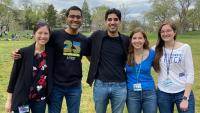January 2023: Alice Huang Lab

Background:
What is the main focus of your lab?
My lab focuses on the development and regeneration of tendons and other related fibrous connective tissues.
How long have you had your lab? When did you join Columbia University?
I started my lab in 2014 at Icahn School of Medicine at Mount Sinai before moving to Columbia University last year in August 2021.
How big is your lab currently?
We are still growing the lab and currently have two fantastic PhD students – Giulia Crosio who moved with me from Mount Sinai and a first year BME PhD student, Emily King. We are recruiting!
Where is your lab located?
We are located in the Black Building on the 14th floor as a member of the Carroll Laboratories in the Department of Orthopedic Surgery.
Current affairs:
What are the most exciting projects/directions in the lab at this moment?
We are currently focusing in three main areas: 1) The role of T cells in regulating tendon regeneration vs scar formation, 2) Using hiPSCs to model human tendon development and identify novel transcription factors that direct tendon cell fate, and 3) Using mESCs and 3D engineered models and bioreactors to study tendon mechanobiology.
Technology:
What are the model systems that your lab is using?
We have established robust protocols to derive tendon and fibrocartilage cells from mESCs and hiPSCs. We also use a very easy tendon injury model where we cut the Achilles tendon without surgical repair. Since we study healing in neonatal mice as our regenerative model, this injury is very reproducible in such small animals. Many of our mice are immune-related mice that are readily obtainable commercially. However we also use a number of lines that enable visualization of tendon and related cells (ScxGFP, ScxmCherry) and Cre lines targeting tendon (ScxCre, ScxCreERT2).
What facilities or equipment does your lab absolutely rely upon? Do you use CSCI cores?
We rely heavily on the CSCI Flow Cytometry core and have to give much credit to Mike Kissner for running such a wonderful facility. Like many other labs, we have also started to do more single cell sequencing and the Genome Center has been excellent.
Training:
What would be your career advice for students/postdocs?
It’s very important to me to have dedicated time to meet with my students weekly. We also communicate often through our lab slack. One thing that has been quite helpful is to do IDPs every 4 months instead of annually. It isn’t a very intensive process, but basically we review accomplishments from the last 4 months and plan for the next 4 months and discuss career goals. I find planning in 4 month increments much more useful since so much can change depending on new data, etc.
Who were your most influential mentors/role models in science and what did you learn from them?
I’ve been lucky to have had many mentors, both formal (such as my PhD and postdoc advisers) and informal. I find it helpful to have different mentors to obtain a diversity of perspectives – there is no single right path to success. I also find that I often will reach out to certain people for career advice and others for science (and a few that are great for both).
Can you recommend courses/lectures in Columbia University that would be most beneficial for students/postdocs?
If you are interested in musculoskeletal research please sign up for our Musculoskeletal Seminar Series :). I have found the CSCI seminar series extremely interesting as I often learn more from other fields. The Tissue Talks series is also highly relevant for our research.
What would be your career advice for students/postdocs?
Try to enjoy yourself.
Are you accepting rotating students at the moment?
Absolutely please reach out!
Lab management:
How do members of your lab celebrate accomplishments?
Historically we have been more food-driven than activity-driven. Every year I host a lab reunion and most alum members who are still in NYC will attend and it is fun to have them meet the new members of the lab. We also enjoy going out for meals.
What is the key to running a successful lab?
It’s important to work with people you like. A very productive but toxic personality will ruin the entire lab dynamics and is just not worth it to me.
What was the most exciting part about starting your new lab?
The people I work with are the most fulfilling part (students and colleagues, etc), but another major thing I find very satisfying is running long-term projects. I always had a hard time leaving my previous labs because I was so eager to continue the work I was doing. Now, I can pursue these questions until I retire.
CSCI:
What was the main reason of you joining CSCI? What are the beneficial aspects of CSCI membership for your lab?
I enjoy meeting and collaborating with other labs applying similar concepts and approaches to their research. We have been working with Dr. Joanna Smeeton’s group and recently started discussions with Dr. Mijo Simunovic’s group for example.